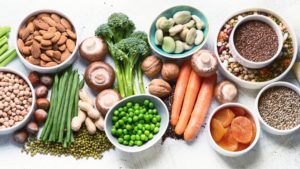
Recent research has tied the gut microbial population—the microbiota—to all kinds of health outcomes. And what they all seem to suggest is that the more diverse your microbiome, and the more “friendly” bacteria you have, the less likely you are to experience illness ranging from depression to heart disease.
How do you improve the neighborhood in your digestive system? Eat more plant-based foods. It’s really that simple. Plant-based foods are generally rich in fiber, which is a great source of nutrition for gut bacteria. The more of this prebiotic fiber they get, the better they become.
In addition to eating more plant-based foods, eating less is also a good idea. Giving your gut a break can go a long way. Most Americans take in around 3,000 calories per day, while 1,800 is probably better. That might look like a massive reduction, but you’ll find that when your diet is made up of nutrient-dense plant foods and unprocessed meats, it’s actually a lot of food. The idea behind building is a strong gut is to stick to nutritionally dense foods instead of calorically dense options.
Some plant-based foods that can help fight inflammation and encourage better gut health include:
- Bananas
- Blueberries
- Artichokes
- Asparagus
- Cruciferous vegetables like broccoli and cauliflower
- Onion
Probiotic-rich foods like kefir, sauerkraut, and pickles can also contribute to a healthy microbiome.
Of course, some things can stifle the neighborhood too. Deep-fried foods, sugary items, and super fatty animal products like bacon encourage a “bad” population that contributes to inflammation that is associated with chronic illness. This stuff is unlikely to have a significant impact if consumed on rare occasions, just keep them from making a regular appearance on your plate.
Gut health is increasingly being recognized as a major player in overall health and disease risk. Finding ways to optimize your population of bacteria could be central in achieving or maintaining a healthy future.